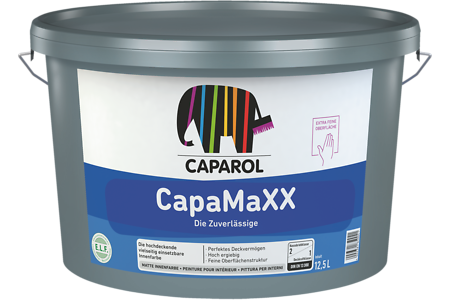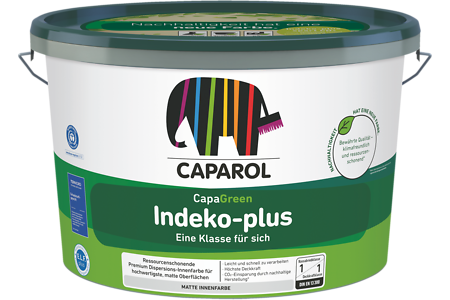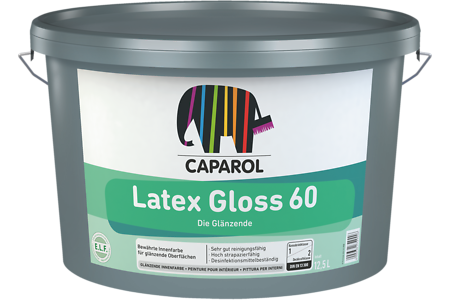Field of Application
Capaver glass fabrics provide for highly attractive, high-grade and individual wall surfaces, due to variations in texture, type, colour shade, gloss level and application technique of topcoats. In accordance with the expected degree of stress or desired visual appearance, all fabrics may easily be coated with suitable paint products and economic renovations are possible, due to individual needs.
Material Properties
- Pre-coated in white.
- Homogeneous, distinctively textured appearance.
- High strength in wet conditions and safe application.
- Rot proof, dimensionally stable.
- Covers small surface cracks (crack bridging).
Material Base / Vehicle
Pre-coated Capaver glass fabrics (VB✱ type) are made of purely mineral glass fibre yarns.✱VB German term: vorbeschichtet = pre-coated
Types that can be delivered
| Type | Texture | Weight per m2 | Roll Size | Pattern Repeat |
| 1100 VB | fine | approx. 140 g | 50 x approx. 1 m | |
| 1132 VB | medium-fine | approx. 160 g | 50 x approx. 1 m | |
| 2120 VB | medium stripe | approx. 185 g | 25 x approx. 1 m | |
| 2165 VB | herringbone, medium | approx. 200 g | 25 x approx. 1 m | >I 1.6 |
| 2170 VB | coarse | approx. 185 g | 25 x approx. 1 m | |
| 2180 VB | double chain, coarse | approx. 205 g | 25 x approx. 1 m | |
| 2410 VB | medium | approx. 200 g | 25 x approx. 1 m | |
| 2440 VB | diagonal, medium | approx. 180 g | 25 x approx. 1 m | >I 1.5 |
| 2460 VB | rhomb, medium | approx. 195 g | 25 x approx. 1 m | >I 8.5 |
| 3185 VB | double-chain, extra coarse | approx. 245 g | 25 x approx. 1 m |
Packaging/Package Size
Selectable unit: One carton per roll.Storage
Store Capaver glass fabrics in a dry place.
Supplementary Product
- Capaver CapaColl GK (adhesive/glue)
- Capaver CapaColl VK (adhesive/glue)
- Capaver Gewebegrundierung (primer)
- Interior paints of the Caparol product range
Note
Capaver glass fabrics (VB) are composed of glass fibres with a diameter > 5 µm, particles of that size cannot enter the respiratory tract. Although the fibres are highly bonded in the fabric, a limited amount of glass particles may be released when cutting the fibres/glass fabrics. This may cause itching of skin to people with a sensitive skin (suggestion: take suitable protective measures), during application, but will fade away after bonding. Capaver glass fabrics do not release any glass fibres after being coated.
The inner structure of the yarns leads, in combination with an eco-friendly dressing, to a high wet strength, compact fabric surface, high ductility and skin tolerance during application.
The products are pre-coated on both sides in white and normally need only one finishing coat, when matt/silk-matt paints in white or bright colours are used.
Substrates
Interior surfaces: Mineral plasters in mortar groups/classes PI (lime plaster), PII (lime-cement mortars) and PIII (cement mortars), PIV (gypsum mortar and ready-mixed gypsum plaster), sandwich-type plaster boards/gypsum plasterboards, gypsum wallboards, concrete.Surfaces with colour contrast: One previously applied priming coat of Capadecor DecoGrund or Caparol Haftgrund.
Substrate Preparation
The substrate must always be solid, dry, sound/stable, clean, even and free from all substances that may prevent good adhesion. Follow Technical Information No. 650. In Germany: Follow VOB, part C, DIN 18366, section 3. Lower temperature limit for application and drying: +5 °C (product, substrate and ambient air).
Method of Application
Roller Application of Adhesive (Glue):
- Apply Capacoll GK (20 % diluted) or CapaColl VK evenly with a paint roller (18 mm piles), but only for 1-2 fabric lengths, depending on the temperature on site.
- Note: Agglomeration of adhesive (glue) must be avoided to achieve a uniformly textured surface.
Spray Application of Adhesive (Glue):
- A minimum of 3 workmen on the job is required.
- CapaColl VK can directly be applied to the wall with airless equipment.
- Capacoll GK should be diluted with 20 % of tap (potable) water, depending on the conditions on site.
- Important: It is suggested to observe the recommended material consumption and to spread the adhesive evenly, avoiding a surplus of applied product.
Advice: Detailed information concerning the spray application of CapaColl are given within our German manual "#843604 Handbuch der Spritztechnologie" and the product related download area of www.caparol.de ("Spritzdatenblatt").
Bedding/Bonding of Glass Fabrics & Fleeces
- To avoid differences of appearance in texture/pattern, always place the fabrics running in one direction and not laterally reversed.
- Capaver glass fabrics should be bonded with butt joints.
- Note: Provide for narrow butt joints, but the forming of bulges must be avoided to achieve a proper visual appearance.
- Press the bonded fabric lengths void-free with sufficient pressure to the full surface using wallpaper scraper. Fix the edges and cut of the excess length with a wallpaper scraper.
- For bonding Capaver glass fabrics on vertical external corners, the length must pass around it for minimum 10 cm.
- For non-vertical corners, the fabrics must be cut at the corner.
Surface Coating System
Intermediate Coat:The intermediate coat forms the basis to achieve a perfect finishing coat. The intermediate coat can only be applied when adhesive and fabric are completely dry, and should be tinted to match the finishing coat in shade. Apply one filling intermediate coat of Capaver Gewebegrundierung before applying coats of thin film paint, e.g. latex paints.
Finishing Coats:
Selection of suitable products for finishing coats is depending on the degree of expected loads and desired gloss level. Coatings must be applied wet-on-wet (also effective for trimming areas). See the following table for further information.
| Loads | Intermediate Coat | Finishing Coat | Gloss Level | ||
| Product | Work Steps | Product | Work Steps | ||
| NORMAL | CapaTrend Malerit E.L.F. Sylitol Bio-Innenfarbe | 1 | CapaTrend Malerit E.L.F. Sylitol Bio-Innenfarbe | 1 | Matt |
| NORMAL– MEDIUM | CapaMaXX MattLatex CapaSilan NespriSilan | 1 | CapaMaXX MattLatex CapaSilan NespriSilan | 1 | Matt |
| Indeko-plus | 1 | Indeko-plus | 1 | Matt | |
| MEDIUM– HIGH | Amphibolin Latex Samt 10 | 1 | Amphibolin Latex Samt 10 | 1 | Silk matt |
| SeidenLatex | 1 | SeidenLatex | 1 | Silk gloss | |
| Amphibolin | 1–2 depending on colour shade | Metallocryl Interior | 2 | Gloss | |
| EffektGrund | 1–2 depending on colour shade | CapaGold/CapaSilver | 2 | Silk gloss | |
| HIGH | PremiumClean | 1 | PremiumClean | 1 | Silk matt |
| Latex Satin 20 Latex 201 SG | 1 | Latex Satin 20 Latex 201 SG | 1 | Silk gloss | |
| Latex Gloss 60 | 1 | Latex Gloss 60 | 1 | Gloss | |
| EXTREMELY HIGH | Disbopox 447 E.MI Wasserepoxid | 1 | Disbopox 447 E.MI Wasserepoxid | 1 | Silk gloss |
| Product | Load Capacity |
| CapaTrend Malerit E.L.F Sylitol Bio-Innenfarbe | - Wet scrub resistance Class 3 according to DIN EN 13300 |
| CapaMaXX MattLatex CapaSilan NespriSilan | - Wet scrub resistance Class 2 according to DIN EN 13300 - Resistant to aqueous disinfectants |
| Indeko-plus Amphibolin Latex Samt 10 SeidenLatex PremiumClean Latex Satin 20 Latex 201 SG Latex Gloss 60 Metallocryl Interior CapaGold✱/CapaSilver✱ | - Wet scrub resistance Class 1 according to DIN EN 13300 - Resistant to aqueous disinfectants |
| Disbopox 447 E.MI Wasserepoxid | - Wet scrub resistance Class 1 according to DIN EN 13300 - Resistant to aqueous disinfectants - Highly scratch- and shock-resistant - Chemical-resistant - Decontaminable according to DIN 25415 |
✱Not tested for resistance to disinfectants.
For more details please consult our corresponding Technical Information of above mentioned products.
Drying/Drying Time
Allow bonded fabric lengths to dry thoroughly before any further coating.
Note
To avoid differences of appearance in texture/pattern, always place the fabrics running in one direction and not laterally inverted.Capaver wall coverings are thoroughly inspected by the manufacturer. In exceptional cases isolated production related weaving faults may occur. These faults are marked at the trimmed edges and correspondingly compensated. They do not entitle to any objection. While cutting and bonding the fabrics, ascertain whether there are no weaving faults. In case of complaint the label with the batch and product numbers (see original carton) must be kept ready. Claims based on material faults cannot be objected after the application of more than 10 fabric lengths.
German Certificates
- Flame-retardancy according to German standard DIN 4102, B1
- Non-combustibility according to German standard DIN 4102, A2
- Decontaminatibility in combination with Disbopox 447 E.MI Wasserepoxid
| Fire behaviour classification associated with Capaver Glasgewebe / Glass Fabrics VB | |
| Coating | Reaction to Fire: Class |
| CapaTrend | A2 |
| Malerit E.L.F. | A2 |
| CapaMaXX | A2 |
| MattLatex | A2 |
| Indeko-plus | A2 |
| CapaSilan | A2 |
| Sylitol Bio-Innenfarbe | A2 |
| Latex Samt 10 | A2 |
| Latex Satin 20 | A2 |
| Latex Gloss 60 | A2 |
| Amphibolin E.L.F. | A2 |
| Nespri®Silan | B1 |
| SeidenLatex | B1 |
| SG201 | B1 |
| PremiumClean | B1 |
| Disbopox 447 E.MI Wasserepoxid | B1 |
German test certificates for the corresponding products are available via www.caparol.de
Disposal
Materials and all related packaging must be disposed of in a safe way in accordance with the full requirements of the local authorities.Particular attention should be made to removing wastage from site in compliance with standard construction site procedures.In Germany: Dispose Capaver glass fabrics as construction site waste.
Customer Service Centre
Tel.: +49 6154 71-71710Fax: +49 6154 71-71711
e-mail: kundenservicecenter@caparol.de
International Distribution: Please see www.caparol.com












